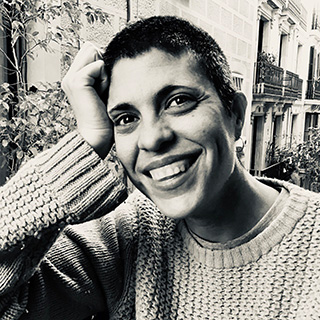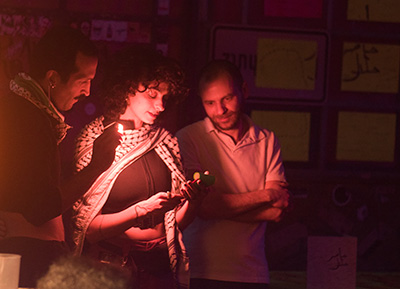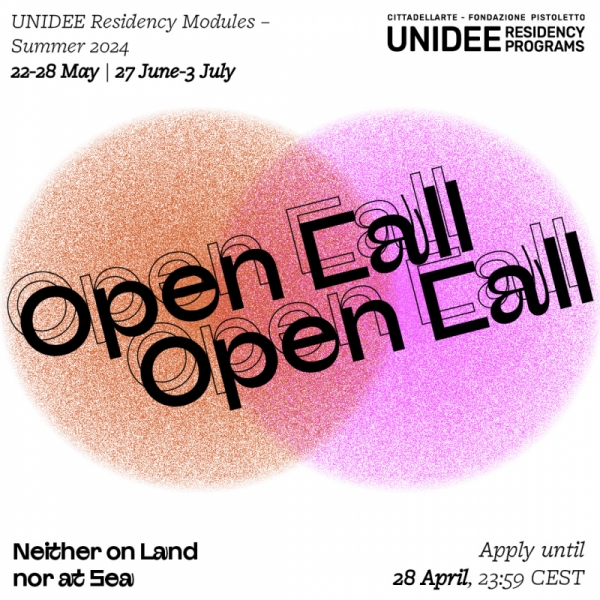UNIDEE Residency Modules: NEITHER ON LAND NOR AT SEA - Module VII and VIII - Summer 2024 | open call & selected residents
UNIDEE Residency Programs and Cittadellarte-Fondazione Pistoletto are pleased to announce two open calls for participation in Module VII and Module VIII in the Summer Season 2024 of Neither on Land not at Sea. Meeting by the Mediterranean Im/Possible, initiated and curated by UNIDEE Visiting Curator Chiara Cartuccia.
Module VII is co-curated by invited mentors Mafe Moscoso & Claudia Delso.
Module VIII is co-curated by invited mentors Fehras Publishing Practices (Nancy Naser Al Deen, Sama Ahmadi and Sami Rustom).
Neither on Land nor at Sea invites to meander around unreducible complications and on shifting grounds, to explore together ways in which geography is historically, socially, and politically produced. The project pluralises Mediterranean concepts/spaces as sites of worldmaking and experimentation in communal living. To do so, it adopts un-grounded geographies and colliding historicities as meeting places, in which to congregate to elaborate on the role played by situated practices and shared processes in the promotion of social transformations, towards epistemic justice.
The UNIDEE modules are programme-based, short-residency formats. Participating residents will be offered the opportunity to expand on their ongoing research and practice exploring Mediterranean complexities and geographical thinking in the arts and beyond, within a group of peers and invited guests. The modules are interlinked, and each contributes to shaping the discourse developed by the project as a whole.
For more information about the curatorial framework, context and scopes of the project, please visit Neither on Land nor at Sea website here.
With the title Todas las aguas son del agua / All Waters Belong to Water, Module VII – Summer 2024, will take place from 22 to 28 May, and it is curated by invited mentors Mafe Moscoso & Claudia Delso.
CONCEPTUAL NOTE, OR A FIRST TRIGGER:
The starting point of our proposal is that we live in Europe in a situation of cognitive darkness that affects our ways of understanding the relationship between life and death and, consequently, our ways to imagine post-apocalyptic scenarios. Therefore, we believe that incorporating non-Western ontologies and imagination through fiction into artistic research opens up the possibility of a deeper understanding of how we think what we think, as a condition for imagining forms of knowledge beyond ontological realism.
It is known that the Mediterranean Sea has been subjected to an unprecedented ecological pressure that has led to its collapse. Part of the responsibility for this collapse lies in a capitalist/colonial vision of the Mediterranean as a spiritless being, a body to be exploited and an object separated from the subject. During modernity, in Europe, “nature” is separated from “culture” and life from death. The hidden face of this process is the coloniality of human and non-human and the separation between life and death. “Nature” becomes an “outside”, that is, an object of domination, exploitation, plunder and domination – just like all those subjects who were outside the logos (De la Cadena, 2018). On the other hand, Despret (2021) explains that, during modernity, a conception of mourning was also imposed in Europe that rests on the idea that when someone dies, they no longer have any form of existence. There is a conception of death and life as everything or nothing. In this way, it can be stated that the collapse of the Mediterranean is a post-apocalyptic capitalist/colonial scenario, because it is an ecosystem that has suffered a radical transformation of the conditions that allow its existence while representing the materialisation of a (Western) cosmology that interprets that the sea has died and that death is the end of life.
METHODOLOGIES:
Our desire is to accompany and take care of a collective process focused on developing ways of speculative research (listening, walking, collective reading and cooking, drawing, assembling rituals). The idea is to imagine, together, scenarios in which present, past and future come into play in order to generate alternative narratives to the hegemonic European view that see death as not accompanied by processes of rebirth.
An extended version of the module’s conceptual frame is available here.
With the title Moasherat: Hader Halal, Module VIII – Summer 2024, will take place from 27 June to 3 July, and it is curated by invited mentors Fehras Publishing Practices (Nancy Naser Al Deen, Sama Ahmadi and Sami Rustom).
CONCEPTUAL NOTE, OR A FIRST TRIGGER:
In a world marked by atrocities, our project, Hader Halal — translating to "with regard to presence"— emerges as a beacon of cultural solidarity and memory dissemination. Recognizing the deep-seated pains housed within archives and by embracing publishing in its most expansive form, we aim to challenge the entrenched power dynamics that thrive on division. If we understand the future as the salvation of the past instead of what follows it chronically then we can practice a pedagogy of commons that can bring healing. Through cohabitation we are co-creating a transformative space where knowledge and vibrant collective memories are shared freely, leveraging the power and warmth of archives, voice, body, and light.
Mentorship, within this framework, is seen as a tangible and dynamic means of fostering connections and shared growth. Hader Halal is dedicated to acknowledging the labour that underpins cultural production and the creation of transcultural spaces. Our approach is to look forward, to reimagine the present in response to the ongoing injustices and traumas we witness, placing time, body, and matter at the forefront of urgent needs.
Our sessions are designed to empower the processes of knowledge production, bolstering both horizontal and vertical solidarity practices. Memory, in this context, is wielded as a tool of resistance. We celebrate and revive the publishing legacy of the Afro-Asian Solidarity Movement, ignited during the 1955 Bandung Conference. Our focus is particularly on the literary quarterly Lotus: Afro-Asian Writings, a publication that symbolised the interconnected hopes and struggles across continents. We commit to a journey of healing, learning, and resistance, aspiring to cultivate a world where cultural solidarity and the dissemination of memory stand as pillars of our collective identity and strength.
METHODOLOGIES:
Mixed format - introduction, archives hospitality, readings, mapping solidarities, dance, screening, walking, cooking.
An extended version of the module’s conceptual frame is available here.
We aim to invite a group of up to 10 residents to take part in each of the two modules.
The programme is open to international participants of all backgrounds, whose practice sits anywhere across the broad spectrum of visual practice and research, with no restriction regarding disciplines, media or methodologies of work. Applications from artists, curators, writers, theorists, activists, all are welcome and encouraged.
The selection of participants will be based on the affinity of the subject matters, concerns and questions participating in the applicant’s work with those expressed by the curatorial framework of the project and the conceptual positioning of the residency module, as well as on the applicant interest and ability to contribute to a programme-based residency whose working is grounded in processes of active exchange and participation.
The residency module will take place at Cittadellarte - Fondazione Pistoletto, in Biella, Italy. The UNIDEE and Cittadellarte spaces will host a large part of the programme, while further opportunities for exploring the urban and rural landscape of Biella and its immediate surroundings will be offered.
Participants will be accommodated within the premises of Cittadellarte, in single rooms with the use of shared bathrooms. The residential spaces offer basic cooking facilities and communal resting areas.
Participants arrival is expected by the afternoon of the day prior to the beginning of the module, departure is expected by the afternoon of the day following the end of the module.
We are committed to meeting to the best of our ability any accessibility requirements an attendee may have; this will be discussed individually with prospective residents.
Further information regarding practicalities and FAQ availablee here.
Participation in the Summer 2024 modules is offered free of charge, and the residents will be provided with free accommodation at Cittadellarte. However, residents will be required to arrange and cover expenses for their travel to/from Biella and for the food/living costs whilst in Cittadellarte.
A limited number of partial and full travel bursaries are made available to those who would not otherwise be able to participate; please remember to state in your application whether you would like to be considered for this opportunity.
The team at UNIDEE remains at your disposal to support you in the travel arrangements and in the visa application process. Additionally, the team will provide you with any documents you may need should you decide to pursue other funding opportunities through your local art councils or via international platforms / funding bodies.
To apply please fill in the form at this link: https://form.jotform.com/240934133236350
N.B: For their application to be accepted, applicants must express their choice of one of the two modules and write their response accordingly.
Deadline for submissions is 28 April 2024, 23:59 (CEST)

Mafe Moscoso, was born in a banana republic (Ecuador), she works and researches between/through/for/with/without the intersections between ethnography, writing and art, from an anti-racist and trans-feminist perspective. She is currently a lecturer and researcher at BAU, Centre Universitari d'Art i Disseny (Barcelona). Her main areas of focus are memory, colonialism, migrations and ethnographic fiction. Artistic research grand Hangar-Sabadell winner (2023) with the project Un oceáno (por) venir: etnoficciones cuir. Author of the fiction book La Santita (Consonni, 2024), the essays Hostal España. el gesto hospedante, una etnografía hospedante (Mr. Griffin, 2024), Biografía para uso de los pájaros: infancia, memoria y migración (2013) and the poetry book Desintegrar el hechizo. Versitos anticoloniales ( 2021), among others.
Claudia Delso Carreira is an activist, researcher and cultural project manager. She works as a consultant at Barcelona Research Institute (IDRA). Art Historian. Postgraduate in Cultural Management and International Cooperation, Postgraduate also in Technopolitics and Rights in the Digital Age. She was the co-coordinator of the First International Circus Festival in the Occupied Territories in Palestine in 2011 and has worked for many years with the saharaui women in the refugees camps in Tindouf (Algeria). As an independent professional she has worked in interdisciplinary cultural projects such as Mov-s around the politics of the body or the International Community Arte Festival ICAF Rotterdam, 2014. She currently co-coordinates the Seminar "Rethinking the Museum: institutional practice and mezzopolitics" within the Program in Critical Museology, Artistic Research Practices and Cultural Studies "Tejidos Conjuntivos" of the Museo Nacional Centro de Arte Reina Sofía (Madrid).

Fehras Publishing Practices is a multidisciplinary artist collective focusing on the interrelations between archives, art, body, light and crafting cultural global histories. Fehras practices Moasherat, an Arabic term which translates to “cohabitations”. Moasherat is the coming together between Fehras and artists Nancy Naser Al Deen and Sama Ahmadi in 2024. Their co-work aims to detect a wide range of cultural and geographical landscapes in order to explore historical representations, the notion of the past in the present, and translation/interpretation as a tool of facing old and new colonial powers. Moasherat creates space for co-witnessing, processing, sharing and re-narrating in hope for possible healing in their community(ies) whether in diaspora or in their home geographies. They are concerned with embodying communality and work with forgetting and reformatting. Fehras Publishing Practices are based at Flutgraben e. V., an art association located in Berlin.
www.fehraspublishingpractices.org/
www.instagram.com/fehras_publishing_practices/
flutgraben.org/
Sami Rustom
they/them
Born 1988 in Aleppo, lives in Berlin.
They completed their bachelor studies in Media at Damascus University in 2012. Their interests in the art career of the trio Fayrouz and Rahbani Brothers played an essential role in building and deepening their knowledge about cultural history of the Eastern Mediterranean. They are interested in tracing archives of Arabic cultural magazines, newspapers, books and private libraries of intellectuals. One of their focuses is on the movement of the publishing archives between physical spaces and digital spheres. They obtained a master’s degree in Library and Information Sciences at Humboldt University in Berlin in 2020. Sami co-established Fehras Publishing Practices with Kenan Darwich and Omar Nicolas in 2015 in Berlin.
Nancy Naser Al Deen
they/them
Born 1991 in Baalbek, lives in Berlin.
Lebanese-Egyptian multidisciplinary artist and scenographer. Nancy's collaboration-based practice utilizes tools of architecture, design, mapping, and their body, to witness, archive, protest, and investigate politics of (non-conforming) marginalized bodies in urban space. They collaborated with various artists, collectives, and art institutions in Berlin and internationally including Fehras Publishing Practices, documenta fifteen, SAVVY Contemporary, Poligonal Office for Urban Communication, Ashkal Alwan, and CLUSTER Cairo among others. Nancy started to collaborate with Fehras in 2019.
Sama Ahmadi
they/them
Born 1985 in Tehran, lives in Berlin.
Iranian multidisciplinary artist and space strategist. Since 2019, they are working on Quasi Objects, a collective project embodying communality. As a Masters student, their research was focused on forgetting and today they are working on reformatting. Grown up in the south as a queer. Their work is embedded in collective practices. They are currently on the board of Flutgraben e.V.. They worked with renowned artists including Natascha Sadr Haghighian, Farkhondeh Shahroudi and Dominique Hurth. Sama contributed as an artistic producer for Fehras Publishing Practices’s work shown at documenta fifteen in 2022.
quasiobjects.com/
UNIDEE Residency Programs is made possible thanks to the support of Regione Piemonte, Fondazione Compagnia di San Paolo, CRT Fondazione Cassa di Risparmio di Torino, illycaffè S.p.A., Fondazione Zegna, European Union’s Creative Europe programme, A.M. Qattan Foundation, Inlaks Shivdasani Foundation, Institut Français Italy, Kimonos Art Center.
